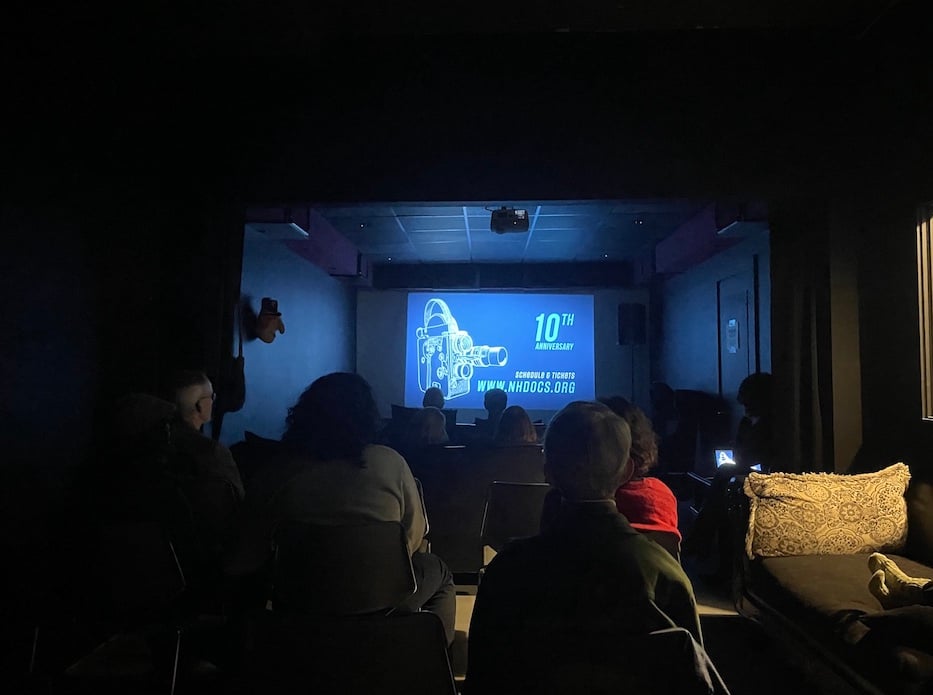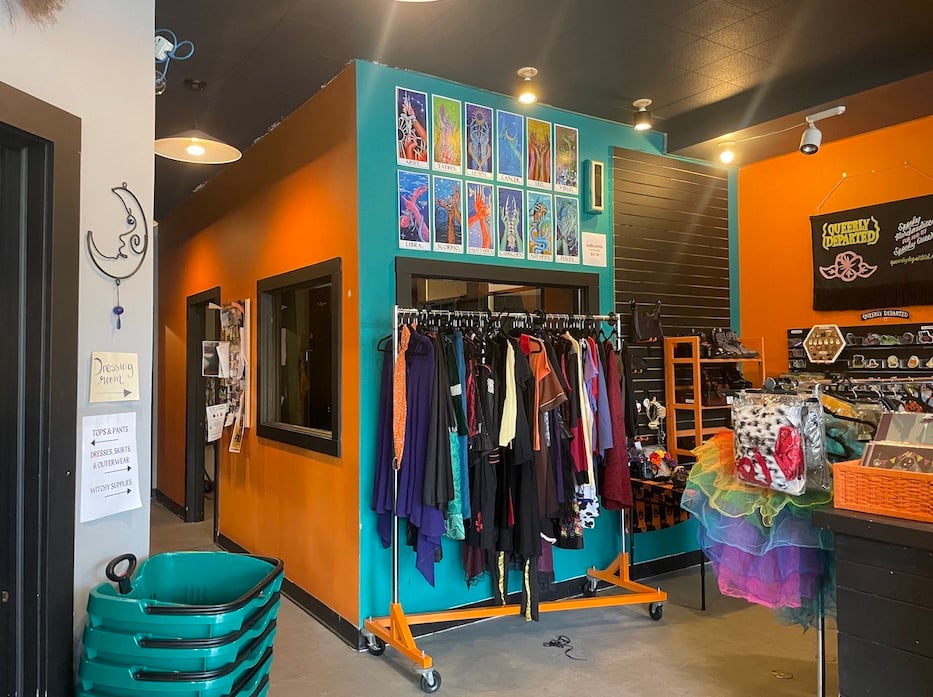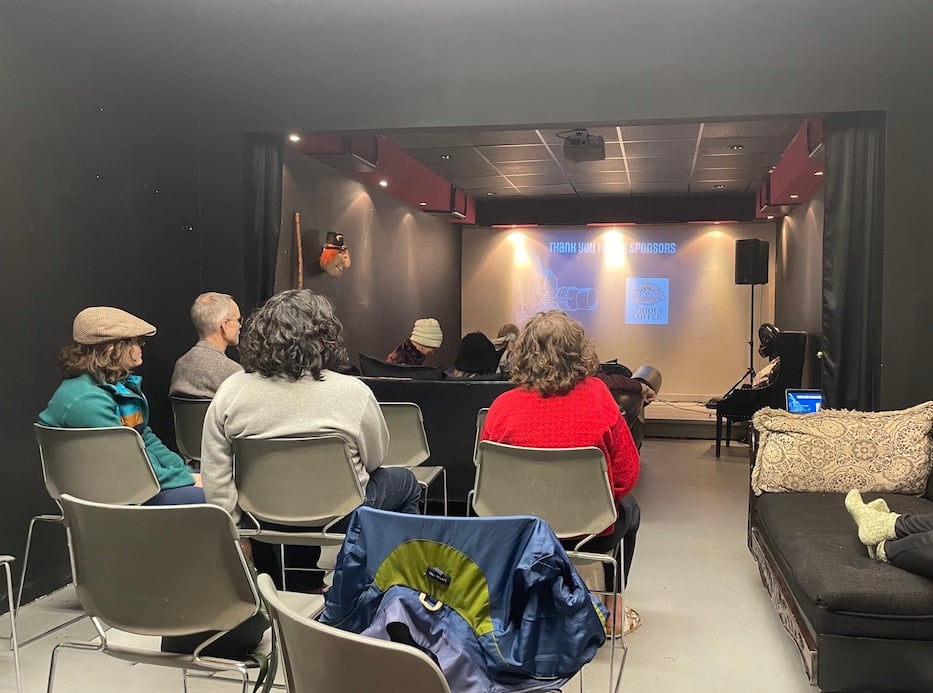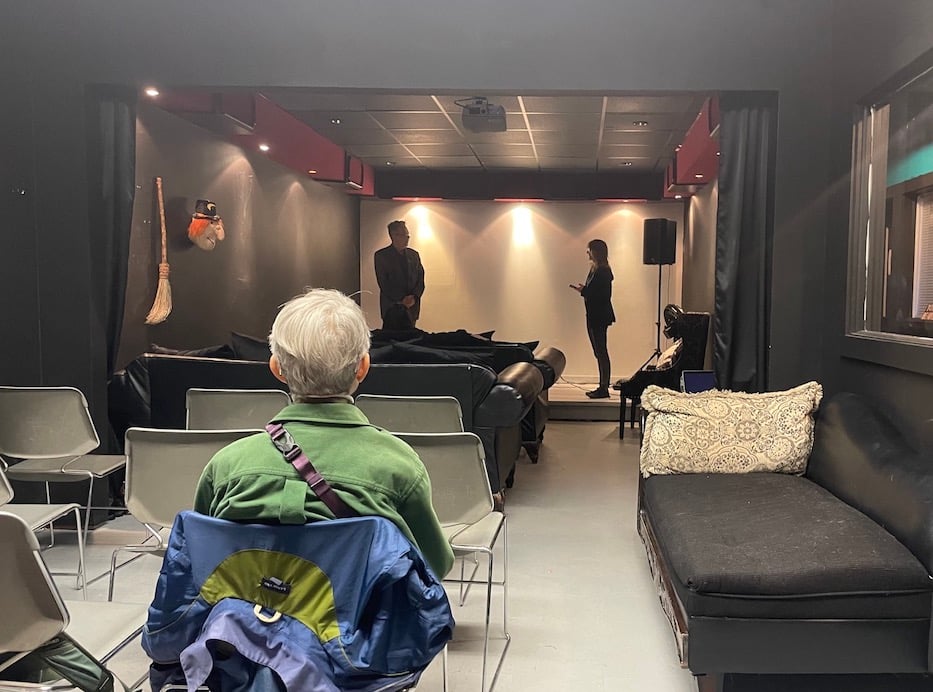
Elena Unger Photos.
As the screen flickered to Sterling Memorial Library at the NHDocs viewing of 1946: The Mistranslation That Shifted Culture, an excited murmur of familiarity rippled through the audience. Nestled in the back bowels of the towering gothic library were reports on the 1946 translation conference that resulted in the word “homosexual” being introduced into the Bible for the first time. If you ask director Sharon Roggio, it was a mistake that “changed the course of history.”
Roggio’s 1946: The Mistranslation That Shifted Culture landed at Witch Bitch Thrift last Sunday, as a part of NHDocs, the New Haven Documentary Film Festival. Held in the store’s cozy and communal black box theater—christened with various paintings of black cats, bats, and skulls transposed onto psychedelic mushrooms— the film centered on how Christianity’s condemnation of homosexuality can be linked to a single biblical mistranslation.
The Black Box’s intimacy, coupled with Witch Bitch Thrift’s celebration of queer culture, made it a strong choice for the screening. NHDocs continues through Oct. 22 at locations across New Haven and Hamden. Tickets, screening times, locations and more information are available here.
“Everything fit perfectly for this film festival,” said NHDocs Co-Founder and Executive Director Gorman Bechard of the documentary. “At the end, you know, a bunch of the jurors just go, this is no-brainer, we're showing this.”

The Black Box’s intimacy, coupled with Witch Bitch Thrift’s celebration of queer culture, made it a strong choice for the screening. Elena Unger Photos.
The documentary relays the poignant and dynamic narrative of two researchers, Ed Oxford and Kathy Baldock, tracing the origins of the 1946 translation that put the word “homosexual” in the Bible. The pair determines that two ancient Greek words, “Malikos” (meaning something akin to effeminate) and “arsenokoitai” (referring to sexual abuse), were erroneously combined and translated as “homosexual.”
The translation has direct implications for the anti-LGBTQ+ rhetoric that has since become part of certain Christian denominations. While some translations of 1 Corinthians 6:9 state or stated that “homosexuals will not inherit the kingdom of God,” the documentary argues that the Bible’s original language did not ever intend for that language. Rather than denouncing all same-sex relationships, the ancient Greek was likely rebuking pederastic practices in which older Greecian men abused their power by penetrating male youth.
In a particularly triumphant scene, Oxford and Baldock go to Sterling Memorial Library to see if there are any archival materials challenging the 1946 Revised Standard Version (RSV) Bible’s translation. After laboriously sifting through thousands of pages, they strike gold. Overcome with emotion, they read a 1959 letter from Reverend Davis S. to the RSV translation committee. The letter cites the use of “homosexual” in the Bible as both a mistranslation and a mistake.

Elena Unger Photos.
With the confirmation of the letter, the RSV Bible translation committee later revised its error, replacing “homosexuals” with “sexual perverts.” Nevertheless, the biblical tie between homosexuality and sin had already seeped into cultural and political rhetoric.
“We should start questioning some of the other things we've learned in history,” Bechard said in an interview after the screening. “Don't believe everything you read.”
The film’s powerful message sticks its landing. 1946 expertly weaves the strands of intellectualism and archival research with an irresistible emotional engine: Roggio’s relationship with her father, an anti-gay pastor.
Roggio, despite her father’s lack of acceptance, speaks on the importance of forgiveness and chooses to continue a relationship with him. Clips of Roggio and her father are interspersed with Oxford and Baldock’s research journey, providing both thoughtful and profoundly moving pushback against biblical literalism as an argument against LGBTQIA+ inclusion in the church.
In one scene, Roggio boldly takes her father to a queer Christian conference. He stands up and publicly disagrees with the reverend’s mantra of inclusion, stating that he will never change his mind. Even so, Roggio gracefully thanks him for being there and wraps him in an earnest embrace.
Oxford and Baldock also act as emotional propellants in the film. Each is developed into a holistic, compelling character. Oxford is a formerly closeted Christian who was ousted from his closest community and tries to find his way back in. Baldock is an impassioned ally who is moved to research queer culture in Christianity after facing a crumbling marriage.

Elena Unger Photos.
“I'm really, really, really inspired by this,” said audience member Victoria McEvoy after watching the film. “It’s time we started finding out some real truths about the sincere but flawed nature of humans who have been responsible for translating over centuries from languages that very few people read, write, understand, teach, interpret.”
The film seemed to resonate heavily with the audience, who let out laughs and shed collective tears throughout the screening. The documentary shined in its crusade to remind audience members to interrogate the social frameworks that are imposed upon them.
It also showed that the mystical and seemingly impenetrable archives of Yale’s very own Sterling Memorial Library are home to content that can rattle purportedly concretized historical narratives.
For its grandiose thematic weight and academic appeal, the documentary also rang out on a deeply personal level. It provided grounds for each audience member to introspect on their relationships with Christianity and homosexuality.
“The God that I believe in is not exclusive,” said McEvoy. “The God that I believe in is inclusive and has given us everything we need to draw the circle big enough to include everyone. We are the ones who choose for whatever reason: ignorance, fear. We are the ones who choose to exclude.”
NHDocs continues through Oct. 22, 2024 at locations across New Haven and Hamden. Tickets, screening times, locations and more information are available here. Listen to an NHDocs-themed episode of "Arts Respond" above.